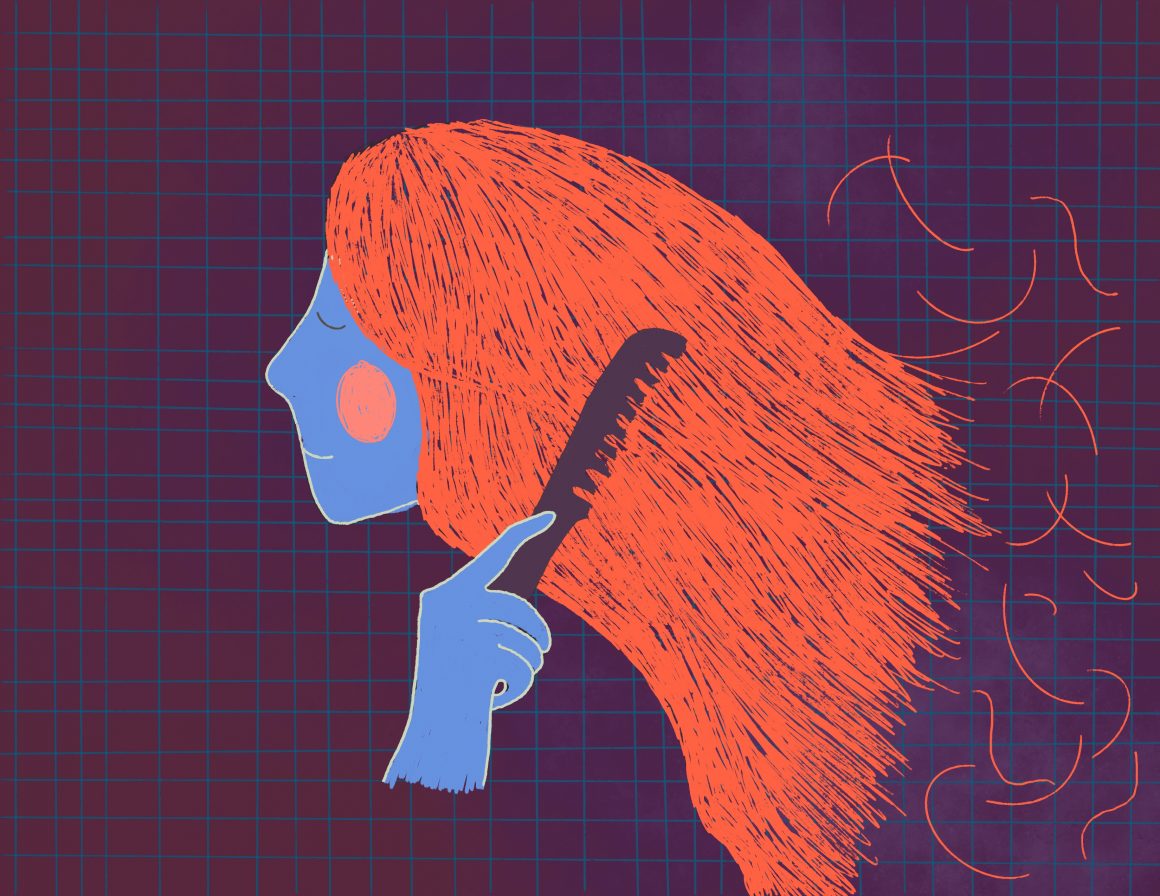
#NoBadHairDays
By Harleen Mundi, October 11 2020—
Waking up in the mornings and bringing yourself to stumble out of bed can be one thing, but standing in front of the mirror with a hairbrush in hand and the jungle that is your hair is a whole other ordeal. At times, I find myself not being able to brush through it for days and I stare at the comb on the counter before shrugging my shoulders and striding away. Other days, I am as determined as ever to tackle the soulless strands and repeat the same positive affirmations I got from Pinterest in the mirror.
My mother used to say that ripping a band-aid off quickly would hurt much less than slowly easing it off your knee. Although her theory didn’t quite stick when I got myself battered and bruised back then, when it came to brushing my hair, I naturally put it into motion. Perhaps it can be described as my sheer impatience with my hair loss and because of this, ignorance was indeed my best pal. I would ignore the hairs left in the wake of my bed, or the washroom floor and especially the spot–– the one that I could never and still struggle to call ‘bald’–– because it was all simply a figment of my imagination.
However, as the years dragged by and my spot grew big enough that I could see it in the mirror, I realized ignoring my situation was far worse than sitting down on a table and staring at it face to face. This encounter often led me straight into what I term “the black hole of worry” or “an inescapable whirlwind of what-ifs.”
At times like this, I get told that “it’s just hair” but it is not a surface level issue the dark psychological impacts are there even if I was not able to initially bring them forward. Rather, it became something to be quite embarrassed about, so much that it affected mundane activities like going swimming, or made me question if I should attend a certain party, because how would I ever hide my spot?
Walking into the doctor’s office was just as difficult, because as much as I wanted and still desire to be fed with reassurance that it will be okay, my heart returns back home with a sinking feeling, mirroring the same way I felt the first time I was diagnosed in June 2019. There was a swarm of thoughts ranging from “Why me?” to “What would I do if it ever got bad?” and, somehow my mind still cannot conjure up an answer to the latter. I was told the last thing I should do is stress and to instead dig deep into what could have triggered the disorder. So there I was, stressing about what in the world I could possibly be stressing about that affected my body in such a drastic manner. Typical Harleen move.

Since then, Alopecia Areata became a creature that plagued both reality and my dreams. An autoimmune disorder that has no cure, the disease causes immune cells to mistakenly target hair follicles, and develop chronic inflammation that results in hair loss. Despite wallowing in the uncertainty of it all, I put into perspective quickly that I was not alone. According to the National Alopecia Areata Foundation (NAAF) around 147 million people worldwide experience Alopecia in their lifetime, and all have various relationships with hair loss that differ from my own. The several types can range in severity with Alopecia Areata being the most common and defined by patches of hairless spots, whereas Alopecia Totalis is complete hair loss on the scalp and Alopecia Universalis impacts the entire body. Whether due to genetics, stress or other factors, treatments may or may not help depending on a case-by-case basis, making it hard to guarantee anything really.
Having been through steroid injections as a potential treatment and now progressing into the use of squaric acid to bring about an immune response and fight the inflammation, I know that the road ahead is filled with unexpected twists. For me, this very unpredictability is equally visible in my emotional response. There are days when I feel so fierce and untouchable but underlying it all is a weight that I can’t shake off. The worry that this is a fact I am going to have to live with forever is burdensome, and comic relief of the situation has become the only way out. As a child I was lucky enough to build a healthy relationship with myself early on when it came to self-love and acceptance. Now, finding something that could change that dynamic has been draining–– it felt like I was regressing back into a stage I left a long time ago.
However, despite the struggles, my optimism now allows me to believe that Alopecia is more my friend than enemy and it has motivated me to lead a healthier lifestyle with better sleep, diet, hydration and stress management. I no longer neglect myself, but live life more lightheartedly, not in ignorance but in acceptance, and enjoy my little victories when it comes to the excitement of seeing regrowth or healing my immune system. Regardless of how much things seem to be out of our control, I learned that mindset is everything in the long run and that there is a lot of inspiration and strength that can be drawn from listening to the stories of people you relate to.
Overall, my purpose in being outspoken about my hair loss is to lessen the stigma and spread awareness about an issue I didn’t even know existed prior to being diagnosed. Although my natural instinct is to conceal the struggle, it has become a huge part of my testimony when it comes to acceptance and improving my mental and physical health. Thus, in celebration of September as the official awareness month for Alopecia, I wanted to embrace hair positivity with #NoBadHairDays to promote and spread the message of being comfortable with who we are despite all that we’ve lost.
